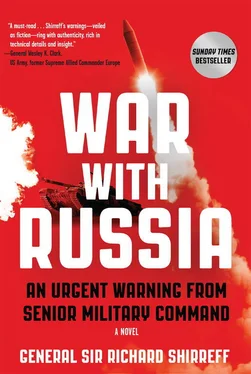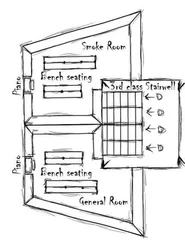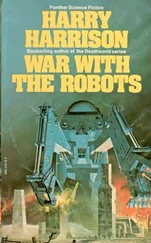Now it was the Greek logistics lieutenant colonel who looked confused, although whether it was lack of understanding of the English language, or naval tactics, McKinlay could not be sure. But instead of getting angry, McKinlay reined himself in. With Greece so unexpectedly falling into line behind Germany and signing up for Article 5, he was going to have to be extra diplomatic and keep the Greeks well on side. The time-honored NATO “two-step”—the time-and-energy sapping diplomatic waltz, anathema to a fighting soldier like him—was just beginning.
“The point is this.” He held up his hand to Black to show he would explain. “Only a headquarters can properly control information and order action. So, if a German maritime aircraft or a Danish frigate detects a Russian submarine in the area, they will report it back to their own national headquarters. That information should then find its way to the Queen Elizabeth and other NATO shipping, but,” he shrugged for effect, “how long will that take? An hour? A day? Queen Elizabeth needs that information instantly, if she is to be able to act on it straight away.
“Conversely, if one of Queen Elizabeth ’s escorts spots a Russian sub anywhere in the area, she needs aircraft up, or escorts over it, to scare it away or sink it. That order will need to be actioned in seconds. At this moment, a request could easily take hours to be received and actioned through the different national headquarters, by which time it will be too late. There’s no point in having all the depth charges and missiles in the world, if they are pointing in the wrong direction, or not ready to fire when they are needed, where they’re needed. So the answer is simple: all maritime assets need to be under NATO command and that includes the Queen Elizabeth Task Group.”
The Greek nodded his understanding, while the Turk shook his head in mock bewilderment that he had even needed something so basic explaining to him. Heads were going to need to be cracked together, McKinlay decided, as he waved to Fritz to continue.
“The bad news is that the land component is in trouble. As you’ll recall, Sir, we had serious problems filling the gaps in the force structure at the recent Global Force Generation Conference back in March.”
McKinlay nodded. He remembered that tortuous conference only too well.
“The nations have not forgotten you being very blunt, Sir,” added Hansen. “You were very clear that if the NRF was to be credible as a NATO reserve, the nations would have to step up to the mark with properly trained forces…”
“Right.” McKinlay could see where the colonel was going with this and interrupted him. “There’s no point in crying over spilled milk. Take me through the detail. I want to know the status of each unit, the nation concerned, and what we need to do about it. I’ll then talk to the Defense Chiefs of the nations facing the biggest challenges and brief SACEUR so that he understands the art of the possible.”
Two hours later, after an exhaustive session with his staff and a couple of difficult telephone conversations with the Defense Chiefs of France and Spain, McKinlay was sitting in SACEUR’s palatial office. Both men could not help but keep glancing at the silent CNN picture on the flat-screen TV, set between the multiple books arranged in shelves next to it. It was showing shots of Russian troops setting up road blocks in the cities of the Baltic states.
McKinlay came to the point. “Bad news first, SACEUR. The land element of the NRF is not fit for purpose. As you know, NATO is meant to be able to deploy forty thousand all-up, with the lead element being the VJTF brigade of five thousand. But, that’s awa’ wi’ th’ fairies.” He momentarily relapsed into Scots in his irritation. “We can’t even deploy five thousand from the VJTF, let alone forty thousand from the follow-up NRF and, for a change, it’s not the force generation which is the problem; it’s moving units across Europe and into position.”
“I’m not sure I’m following you on this one, Dave.”
“We’re seeing the unintended consequences of closing internal European borders as a result of the migrant crisis. To give you an idea… The VJTF is running into all sorts of problems moving equipment and ammunition across borders. For example, I’m hearing that it could take up to fifteen days to get the diplomatic clearances to move ammunition from Germany into Poland, all the result of efforts to counter jihadi terrorists moving freely about Europe after the Paris attacks. More than that, we’ve just heard that the Albanian and Croatian units, which are inbound from the Balkans, are stuck on the Hungarian border, because the border police are not letting them cross as a result of the measures put in place to control refugees.”
SACEUR now nodded, but looked angry. The failure of the EU and NATO to work together as a result of the politics of the eastern Mediterranean never failed to irritate him.
“Anyway, I’ve talked to Frontex, the EU agency responsible for coordinating border management, but it’s been next to useless. To cap it all, the Turks are vetoing any parallel work with the EU because Cyprus was admitted to the EU without resolution of the issue of Turkish-occupied North Cyprus. Conclusion: we’re not going to get anything quickly and some not at all. The Russians may have done a brilliant job of forcing the shirkers into agreeing Article Five by sinking the two NATO ships and slaughtering the US Air Force detachment at Lielvārde, but be under no illusions, putting their names to an agreement and actually sending forces to fight the Russians are two very different matters.”
Admiral Max Howard rubbed his chin reflectively. “Hmm, from what you’ve just told me, I’m not sure we’d want some of them anyway…”
McKinlay nodded his agreement. “Exactly. A brigade made up of fourteen nations who’ve never trained together properly is a pretty flaky force to put into a fight.”
“OK, Dave, let’s look on the bright side,” SACEUR continued. “I’m not sure we’re in the business of fast reaction with land forces anyway. As you say, it’s too late to save the Baltics. The President has won this round. But we are in the business of pulling in the allies to demonstrate our readiness to respond to any more aggression. Stop them heading for, say, Poland. All we’ve got at the moment is maritime forces and even then, although Article Five has been declared, some nations will have to go to their parliaments before they can ratify it.” Howard was clearly referring, obliquely, to the British prime minister’s dependence on the support of the House of Commons, while in Germany the Bundestag and Constitutional Court would doubtless demand to have their say.
McKinlay watched SACEUR look out of the window, as he considered the gravity of the situation that he faced as NATO’s strategic commander. Decision made, he turned to face him again.
“Dave, I’m thinking about my enemy… about the President, holed up in the Kremlin, surrounded by his small clique of advisers, paranoid about an attack from NATO. He thinks he can control the dynamic of what he has started. He believes, and the others will be telling him, that now that he’s got the Baltics he’ll be able to hunker down… that the threat of his S400 and nuclear Iskander missiles in Kaliningrad is more than enough to ensure we won’t dare to try to recover the Baltic states.”
“He might hunker down, which would be the clever thing to do,” responded McKinlay. “But, just like Hitler, he may think it was too easy and that may encourage him to keep going while he can.”
“Good analogy, Dave. Hitler initially had no intentions of occupying France or planning an invasion of Britain, but when it came to it, he found it much easier than he’d expected. Then he realized that if he inflicted a crushing defeat on his enemies, they’d never be able to come back at him. The President is not only paranoid with his fear of NATO, but he’s also paranoid because he knows that the only way he’ll leave the Kremlin is feet first… either as a result of old age, or with a bullet in the back of his head. If he’s to make it the former, he’s got to stay in power, come what may, and that means he’s got to keep going. If he’s found it so easy to take the Baltics, what is to stop him marching into Warsaw? Or even Berlin? He’s making the age-old mistake of thinking that war has a logic and that he can control it. But no one can control the dynamic of war once Pandora’s box is open. He’d have done well to have studied Clausewitz.”
Читать дальше












